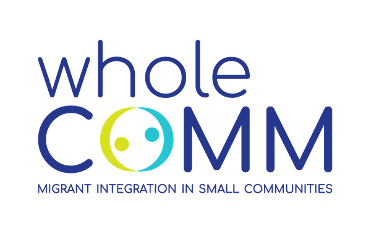
Over the last few years, the EU has received unprecedented numbers of migrants and asylum seekers, often in an unorderly way. This has led to a growing immigrant presence in scarcely prepared small and medium-size towns and rural areas (SMsTRA). The way in which these local communities respond to this challenge will deeply shape the future of integration in Europe. Whole-COMM proposes an innovative whole-of-community (WoC) approach to the analysis of the integration of post-2014 migrants in small and medium-sized towns and rural areas (SMsTRA). Building upon and reaching beyond definitions of immigrant integration as a two- or three-way process the WoC perspective conceives of integration as a process of community-making:
-
that takes place in specific local contexts characterised by distinct configurations of structural factors in terms of i) local economy and the labour market, ii) demographic composition and trends, and iii) levels of socio-cultural diversity and historical relations with migrant-related groups;
-
that is brought about by the interactions of the multiple actors – individuals, organisations, institutions and/or corporate entities – that shape the local community with their multilevel and multi-situated relations, networks, interests and resources;
-
whose outcomes are open-ended and can result in either more cohesive or more fragmented social relations.
The Brussels School of Governance (BSoG) and VUB’s Brussels Interdisciplinary Research centre on Migration and Minorities (BIRMM) are among the partners in this EU-funded (Horizon 2020) project. Whole-COMM is a collaboration between thirteen partner organizations, coordinated by Collegio Carlo Alberto, Italy. The project adopts a cross-country (eight EU and two non-EU countries) and cross-locality (40 localities) comparative approach. The BSoG-BIRMM team participates in several work packages and will conduct fieldwork in three to four small and medium-sized towns in Belgium. The outcomes of the project can be followed on its dedicated website.